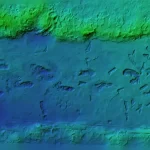New Scientist
Image: aperte
Dyed pink and doped with acid, the small, inanimate drop of oil is deposited at the entrance to the maze – and immediately sets off towards the exit. A few minutes later, it emerges at the other end.
No one would equate this apparently astonishing problem-solving with intelligence. But new theories on human intelligence and the brain suggest the simple molecular processes governing the oil droplet’s apparently smart behaviour may be fundamentally similar to those that govern how we act.
A decade ago Toshiyuki Nakagaki, now at Hokkaido University in Sapporo, Japan, reported that the slime mould Physarum polycephalum could negotiate a maze to reach food at the exit. Boldly, his team wrote in Nature: “this implies that cellular materials can show a primitive intelligence”.
Now Bartosz Grzybowski, a chemist at Northwestern University in Evanston, Illinois, has shown that a simple oil droplet floating on top of an aqueous solution can also navigate a complex maze – in this case to reach an acid-soaked lump of gel at the exit. Read more on newscientist.com…








